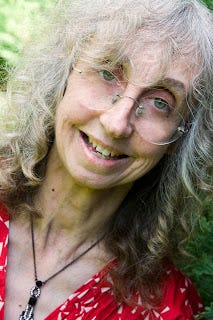Poetry, Horses, and Lemon Polenta Cake: Alison Brackenbury at the Cheltenham Literature Festival

Once there was a poetry festival so unpunctual that its audiences, as at a fashionable party, always arrived half an hour late. Once a poet reading at a festival asked his listeners if they had a copy of the collection he had left at home. Once, as a Nobel prizewinner crooned into a radio mike, a deaf listener stalked out, slamming the door. Once a speaker delivered a fascinating talk to an audience whose front row were all soundly asleep. These tales, from many corners of Britain, are all mine, except the last, which came from a festival director. I was younger when I heard it. I laughed. Now I would be snoring.
Though not tonight, with coffee coursing through my veins as the planets rise through the high, cold skies. I have been to the Cheltenham Festival – of Literature. For ‘the Festival’, in Cheltenham, means the races, where magnificent, highly strung creatures may meet untimely ends. Poets should take care not to confuse the two events.
Like the races, Cheltenham’s literary festival runs like a beautifully oiled machine, feeding and cosseting its participants, and steering them, on time, past a forest of tents, to their destination. It is an alternative world, for some, bright with celebrity; for me, a series of dizzying trips to the tiny planet which is poetry. In between – for I live here – I worked in my boiler suit in our metal finishing business, told the pony, on the hills, not to tread on my feet, and counted Coxes into my shopping trolley. Then the caffeine sang once more.
On Monday night I heard an affable, expansive Cuban poet. On Wednesday night, I stood on stage, to help celebrate an anthology, and watched a pile of signed books carried off singly into the unread dark. On Friday night – today – I heard, for the first time, a marvellous young poet whose work I vowed to buy,after my yearly meeting with a friend. We sat, eating lemon polenta cake. (Idleness has such golden crumbs.) We were in a tent with barley-sugar columns of blue and gilt. We quoted, we gossiped. I bought more coffee. But the carousel turned; hungry crowds rushed in from another reading, and we had to go.
I come down the lane to the workshop, where I left my car in late and lazy sun. The stars spin. In the weak streetlight I see a Victorian stable building, half-restored. Its ceiling is a mass of thin wooden strips, a tangle of lines in faint starlight. The festival has gone, like a distant music. The air is cold and silent. It is time to re-build. It is time to work.
Singing in the Dark by Alison Brackenbury
Open publication - Free publishing - More british poetry
Alison Brackenbury was born in Lincolnshire in 1953 and studied at Oxford. She now lives in Gloucestershire, where she works, as a director and manual worker, in the family metal finishing business. Her Carcanet collections include Dreams of Power (1981), Breaking Ground (1984), Christmas Roses (1988), Selected Poems (1991), 1829 (1995), After Beethoven (2000) and Bricks and Ballads (2004). Her poems have been included on BBC Radio 3 and 4, and 1829 was produced by Julian May for Radio 3. Her work recently won a Cholmondeley Award. Her latest collection is Singing in the Dark (2008, see above): 'A quiet lyricism and delight' (the Guardian).



